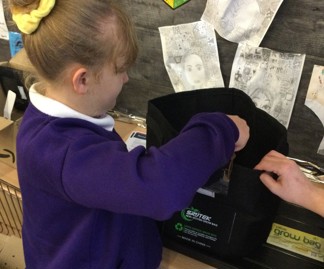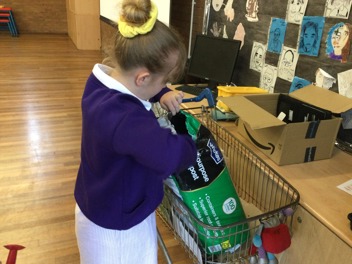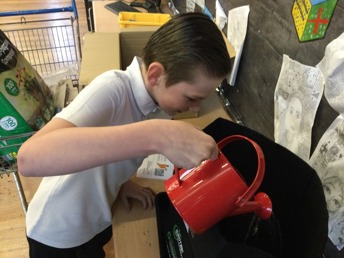Feeling close to mother nature and making the most of what our wonderful world has to offer doesn't have to be difficult – in fact, you can do it from the comfort of your own home or within your community. To celebrate National Gardening Week 2022, the Lovell Homes team in the North West has compiled five fun and simple suggestions for how you can experience the joy of growing and creating beautiful green spaces. - indoors and outdoors - and show your love for people and planet. And it doesn’t have to cost the earth.
- Pots and plants
Gardening is not only great for getting some exercise and fresh air, but it can also boost your mood and mental wellbeing. And what's more, you don't need a lot of space to get started - even a few pots on a balcony or windowsill will do. If you're not sure where to start, try growing some herbs or vegetables that you can use in your cooking. Not only will you be doing your bit for the environment, but you'll also get to enjoy some delicious home-grown produce.
Grow bags are a really easy way to implement this into your lifestyle and can be used to grow all kinds of fruit and vegetables, from strawberries to potatoes. They come pre-filled with soil and nutrients so all you need to do is plant the seeds and get watering.
To celebrate National Gardening Week, our North West team provided two schools in the region with grow bags that have clear windows, along with tools and seeds to allow youngsters to ‘grow their own’. More than 100 children will be able to watch their onions, potatoes, and carrots as they take root and grow through to harvest – a science lesson with a difference.



- Look inward
If you're looking for a way to relax and unwind, why not try nature journaling? All you need is a notebook and something to write with, and you can document your observations of the natural world and wildlife around you. This can be a great way to connect with nature, and you may be surprised at how much you can learn by simply taking the time to sit and listen.
Gardening enthusiasts might also want to create a ‘plant diary’, which comes complete with watering and planting records, top tips to enhance the growth of your plant, how to treat them, and details of the conditions they thrive in.
Another great way to enjoy nature is through peaceful contemplation. All Lovell homes offer private gardens or public open space where you can hopefully find a spot that feels calming and conducive to reflection and spend some time sitting in silence. This can be an excellent way to de-stress and clear your mind, and you may even find that you feel more connected to nature as a result.
- Sustainable products at the ready
You can create a healthy eco-system through gardening and creating a plant community that attracts birds, pollinators, and other wildlife. However, gardeners can go one step further by considering the steps they take to achieve this.
Take compost for example.
Peat is a pesky ingredient found in many types of compost, which can quickly turn into carbon dioxide - directly contributing to greenhouse gas emissions. However, there are now plenty of alternatives which mean that the conscious gardener can cross this item off their list.
Compost bins are also a great option. Consider buying one or making your own and filling it high with grass cuttings, leaves and vegetable leftovers - such as potato peels and carrot ends. Every few weeks, turn your compost pile and after six months, the product can be used to mulch, feed, and improve soil. A perfect example of how ‘one man's trash is another man’s treasure.’
Gardeners might also consider using rain barrels to capture rainwater to reduce water consumption. Consciously selecting recycled or reclaimed garden supplies can also minimise your environmental impact – so shop around for second-hand or get creative.
- Give wildlife a helping hand
A fun way to engage children in National Gardening Week is by making some areas in your garden or any spare outdoor space you have, into a wildlife retreat. Creating bird and bug-friendly hideouts helps nature to thrive. A window feeder is a nice way to allow youngsters to see our feathered friends up close, while rockeries, log piles and ponds are welcome places for creepy crawlies and amphibians.
Allowing some parts of your garden to remain wild or overgrown is an easy way to promote biodiversity while giving children a spot to get dirty and learn about the world around them. Wildflower planting makes an important contribution to the environment with Lovell sites featuring green areas wherever possible, for instance the wildflower spaces on sites such as Roman Heights and Weston Woods. Small changes such as hedgehog highways and bee bricks are also incorporated where appropriate.
- Step outside
Walking outside and taking in fresh air is one of the simplest and healthiest things you can do to connect with nature. Not only does it give you a chance to move your body, but it also allows you to appreciate the beauty that surrounds us. Springtime is a great time to get out and explore, as flowers are blooming, and the weather is generally mild. Many of our developments offer stunning areas to walk or cycle, such as Weston Woods in the Cheshire countryside, the parks and open spaces around Shawbrook Manor in Lancashire and the fresh, Flyde Coast near Woodlark Chase – step outside and take in the natural surroundings of the nearby coastline or the promenade.
Another simple way to show your love for the planet is to simply pick up litter when you see it. This not only helps keep our environment clean, but it also helps prevent animals from being harmed by eating or getting tangled in trash.
So, get out there and celebrate National Gardening Week by enjoying all that nature has to offer!
If you’re considering a move to the North West, why not take a look at our great range of new homes across the region? Just use the simple map tool on our homepage.
